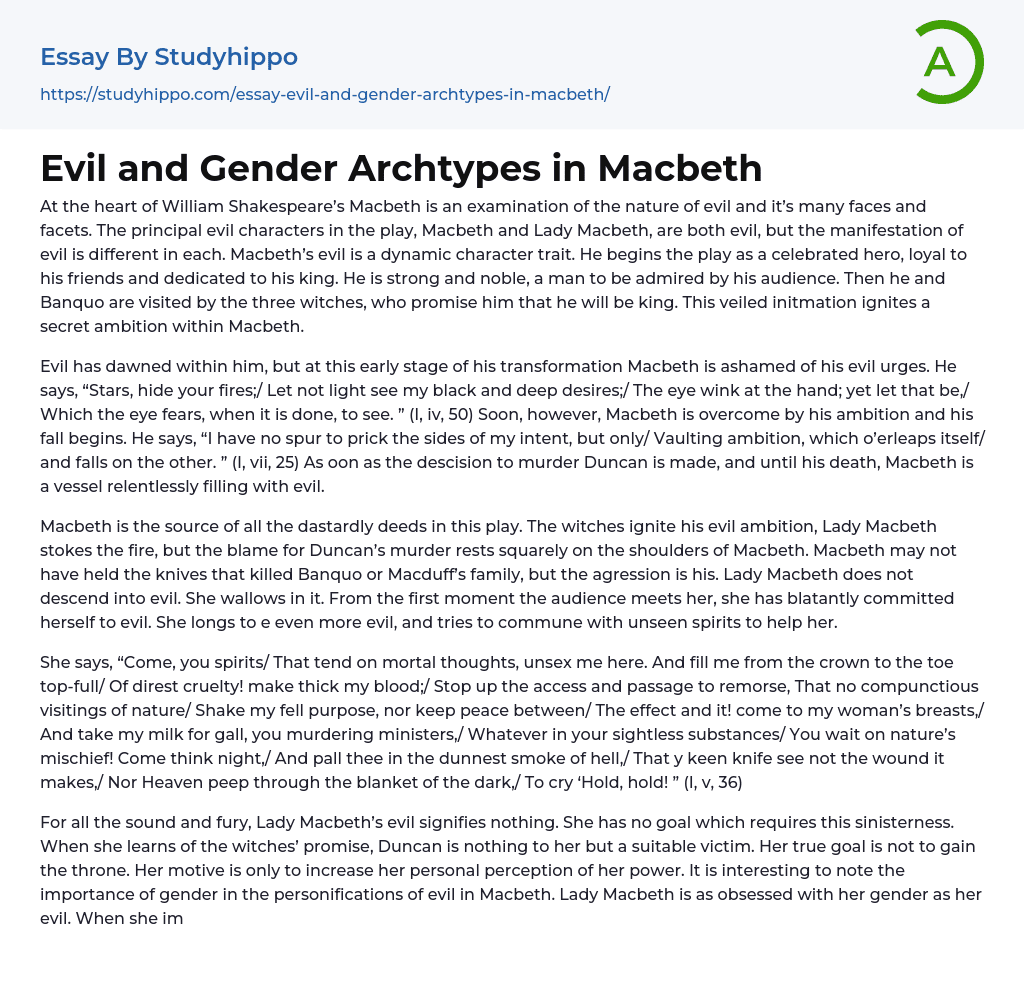The central theme of William Shakespeare’s Macbeth is an exploration of the nature of evil and its various forms. The two main characters, Macbeth and Lady Macbeth, embody different manifestations of evil. Macbeth’s evil is a dynamic characteristic. Initially, he is depicted as a revered hero who is loyal to his friends and devoted to his king. He possesses strength and nobility that inspire admiration from the audience. However, his encounter with the three witches, who prophesize his future kingship, stirs a hidden ambition within him.
Macbeth, in the midst of his transformation, is initially ashamed of his evil desires and urges. He requests the stars to hide their fires, so that light does not witness his dark desires. He hopes that his hand will perform the deeds his eyes fear to see. However, his ambition eventually overpowers him, l
...eading to his downfall. He acknowledges that he lacks a legitimate reason to commit the act, aside from his overpowering ambition. As soon as the decision to murder Duncan is made, Macbeth becomes a vessel constantly being filled with evil until his eventual demise.
The main source of all the wickedness in this play is Macbeth. The witches ignite his evil ambition, while Lady Macbeth intensifies it. However, Macbeth bears the blame for the murder of Duncan. Though he may not have physically wielded the knives that ended Banquo and Macduff's family, the responsibility for their aggression lies with him. While Lady Macbeth does not become evil, she indulges in it. From the very first encounter with her, she openly pledges herself to wickedness. She desires to become even more malevolent and seeks assistance from unseen spirits.
Lady Macbeth
commands the spirits to unsex her and fill her with cruelty, blocking any remorse or hesitation that may interfere with her ruthless intentions. She desires her womanhood to be stripped away, as she sees it as a symbol of weakness. The wickedness she embodies serves no purpose other than to satisfy her personal thirst for power, rather than aiming for any specific goal. Interestingly, gender plays a significant role in the portrayal of evil in Macbeth, as Lady Macbeth is consumed by her own femininity and the limitations it imposes on her.
Being a woman makes her socially dependent on her husband. She believes that her femininity is responsible for the pity, understanding, and regret that hinder her ability to act freely. She perceives her gender as a source of physical frailty. When she tells Macbeth that she has breastfed a child and understands the tenderness of a mother's love, she admits that she would have rather torn her nipple from the baby's gums and dashed their brains out while they smiled at her.
The text illustrates the rejection of the womanly self, favoring physical power instead to "dash brains out." The protagonist attempts to convince herself that she can overcome her natural emotions and urges Macbeth to kill Duncan for the same reason – to prove her own cruelty. However, after witnessing the murder of Duncan, she acknowledges that if he had not resembled her father while sleeping, she would have done it. Despite committing the murder, her self-doubt and insecurity remain untouched.
Lady Macbeth had expected the evil deed to make her feel powerful, but it didn't. She expresses this when she says, "Naught’s had,
all’s spent,/ Where our desire is got without content." Lady Macbeth doesn't realize that her greatest advantage in evil is her feminine intelligence. She is the one who plans and deals with the emotional and mental consequences of their actions, while Macbeth is overwhelmed. Macbeth's evil is physical; he acts violently. Unlike Lady Macbeth who plots and waits, Macbeth rushes into violence. His evil is brutal and impatient. His weakness lies in his inability to control his mind.
- Social Construction of Gender essays
- Banquo essays
- Macbeth Ambition essays
- Boy essays
- Gay essays
- Gender essays
- Gender Identity essays
- Gender Roles In Society essays
- Gender Stereotypes essays
- Girl essays
- Homosexuality essays
- Human Sexual Behavior essays
- Lgbt essays
- Man essays
- Masculinity essays
- Sexual Orientation essays
- Transgender essays
- Woman essays




